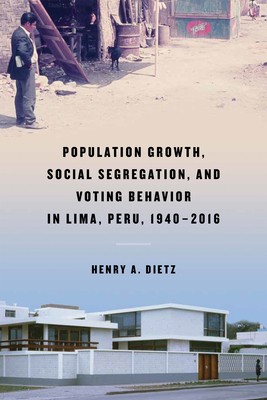
- We will send in 10–14 business days.
- Author: Henry A Dietz
- Publisher: University of Notre Dame Press
- ISBN-10: 0268106134
- ISBN-13: 9780268106133
- Format: 15.2 x 22.9 x 1.6 cm, hardcover
- Language: English
- SAVE -10% with code: EXTRA
Population Growth, Social Segregation, and Voting Behavior in Lima, Peru, 1940-2016 (e-book) (used book) | bookbook.eu
Reviews
Description
As one of South America's larger capital cities, Lima, Peru, is remarkably understudied as a demographic and economic entity unto itself. In this important book, Henry Dietz presents an in-depth historical, sociological, and political analysis of a major Latin American city in the post-World War II period. Dietz examines electoral data for Lima's districts from six censuses conducted between 1940 and 2007, framed against a backdrop of extensive demographic data for the city, to trace the impact of economic collapse and extended insurgency on Lima and its voters. Urbanization in Lima since World War II has at times been rapid, violent, and traumatic, and has resulted in marked social inequalities. Dietz looks at how equity across the city has not in general improved; Lima is today segregated both spatially and socially. Dietz asks if and how a high degree of segregation manifests itself politically as well as socially and spatially. Do urban dwellers living under profound and enduring social segregation consistently support different parties and candidates? As institutional political parties have faded since the 1990s and have been replaced by personalist movements, candidacies, and governments, Dietz explores how voters of different social classes behave. The result is a vital resource for researchers seeking well-contextualized information on elections and economics in Peru. This book will be of interest to scholars of politics or economics, especially in Latin America, but also to a much wider audience interested in how the developments in Lima, Peru, affect the global sociopolitical climate.
EXTRA 10 % discount with code: EXTRA
The promotion ends in 19d.10:27:20
The discount code is valid when purchasing from 10 €. Discounts do not stack.
- Author: Henry A Dietz
- Publisher: University of Notre Dame Press
- ISBN-10: 0268106134
- ISBN-13: 9780268106133
- Format: 15.2 x 22.9 x 1.6 cm, hardcover
- Language: English English
As one of South America's larger capital cities, Lima, Peru, is remarkably understudied as a demographic and economic entity unto itself. In this important book, Henry Dietz presents an in-depth historical, sociological, and political analysis of a major Latin American city in the post-World War II period. Dietz examines electoral data for Lima's districts from six censuses conducted between 1940 and 2007, framed against a backdrop of extensive demographic data for the city, to trace the impact of economic collapse and extended insurgency on Lima and its voters. Urbanization in Lima since World War II has at times been rapid, violent, and traumatic, and has resulted in marked social inequalities. Dietz looks at how equity across the city has not in general improved; Lima is today segregated both spatially and socially. Dietz asks if and how a high degree of segregation manifests itself politically as well as socially and spatially. Do urban dwellers living under profound and enduring social segregation consistently support different parties and candidates? As institutional political parties have faded since the 1990s and have been replaced by personalist movements, candidacies, and governments, Dietz explores how voters of different social classes behave. The result is a vital resource for researchers seeking well-contextualized information on elections and economics in Peru. This book will be of interest to scholars of politics or economics, especially in Latin America, but also to a much wider audience interested in how the developments in Lima, Peru, affect the global sociopolitical climate.


Reviews